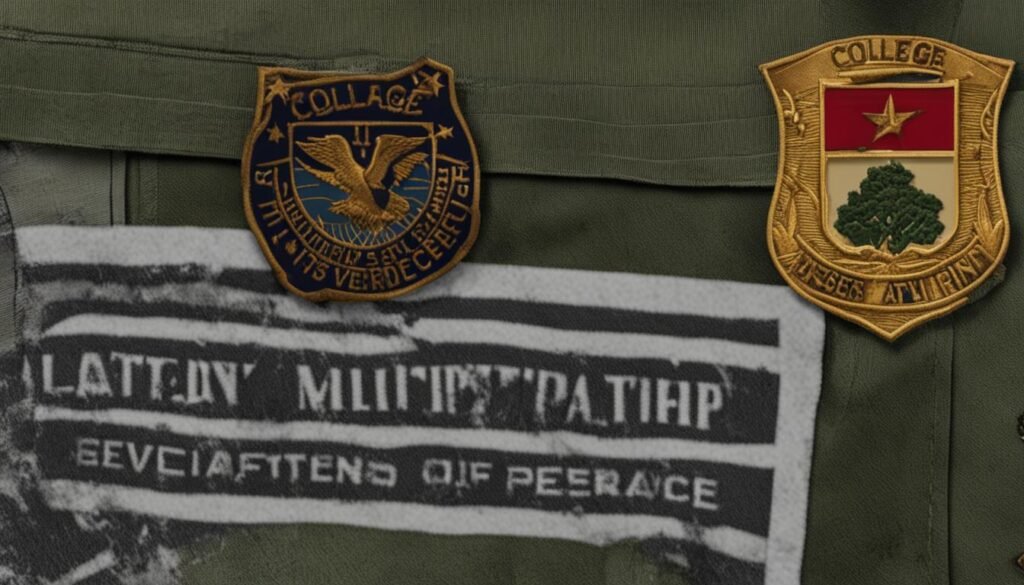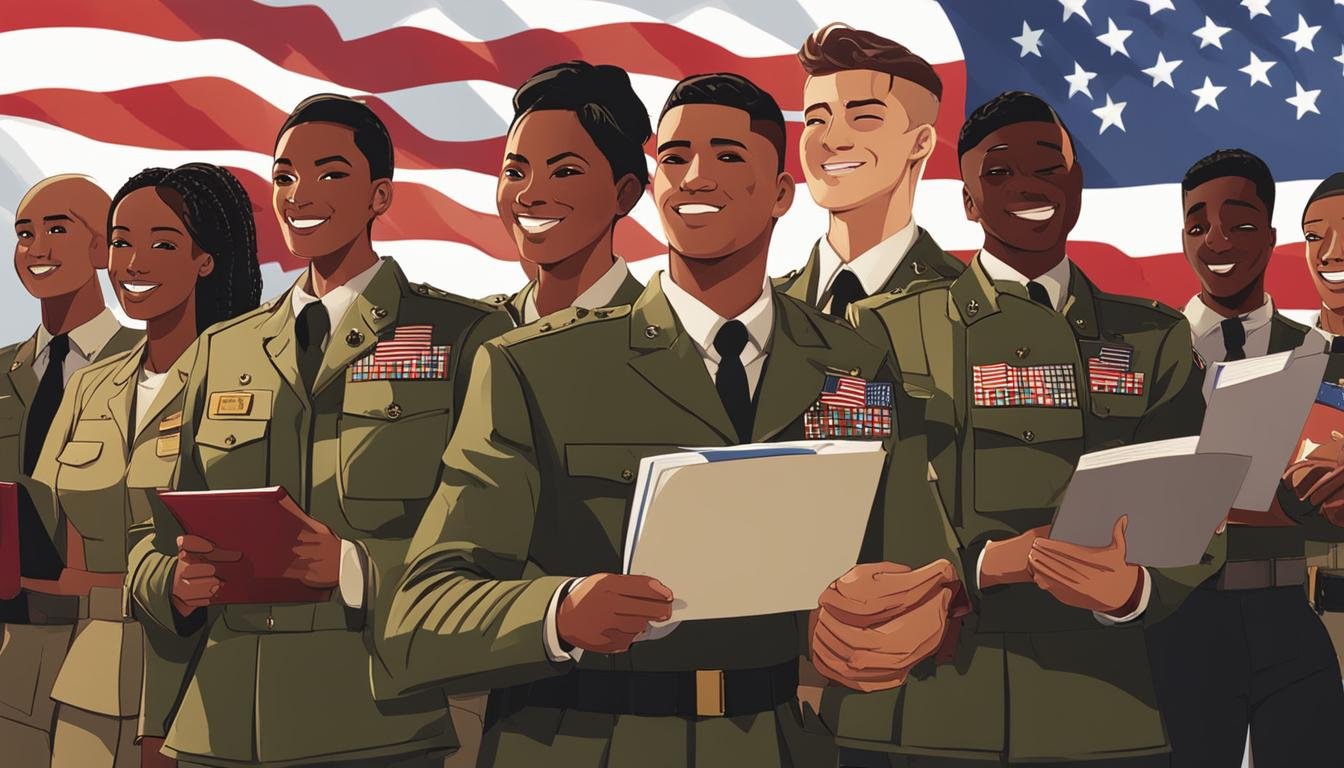In today’s competitive college admissions landscape, many factors can influence the decisions made by admissions committees. One such factor that holds significant weight is military service. The experiences gained through military service can have a profound impact on college applications and admissions outcomes. Understanding the influence of military service on college admissions is crucial for both prospective students and colleges alike.
Key Takeaways:
- Military service can have a significant influence on college admissions decisions.
- Admissions committees value the unique experiences gained through military service.
- Military service can enhance an applicant’s profile by showcasing valuable qualities such as leadership, discipline, and resilience.
- Colleges recognize the importance of diversity and actively seek applicants with military backgrounds.
- It is essential for military service applicants to effectively communicate their experiences and the skills acquired during their service in their college applications.
The Importance of Diversity in Military Leadership

Military leaders recognize the significance of diversity within the officer corps of military academies. While a majority of military officers come from civilian universities and participate in programs like ROTC, graduates of service academies play a vital role in ensuring a diverse leadership structure. It is essential for military academies to reflect the diversity of the soldiers they will ultimately lead. This emphasis on diversity within the military highlights the importance of cohesion, collaboration, and effectiveness within military units.
By promoting diversity in military leadership, service academies contribute to the institutional legitimacy and operational effectiveness of the military. Through their exemption from the Supreme Court’s decision on race-conscious admissions, military academies are afforded the opportunity to prioritize the selection of candidates who can offer a unique range of perspectives, experiences, and backgrounds. This diversity fosters an inclusive and equitable environment that can help cultivate effective military leadership.
The Benefits of Diversity
A diverse officer corps brings a range of perspectives and approaches to problem-solving, decision-making, and strategic planning. With a team that represents different racial, ethnic, cultural, and socioeconomic backgrounds, military units can better understand and respond to the complexities of diverse communities and conflict situations. The inclusion of diverse voices in leadership positions also helps to build trust and rapport with the soldiers they lead, leading to greater cohesion and morale within military units.
The Role of Affirmative Action
Affirmative action plays a crucial role in admissions decisions at military academies, similar to civilian colleges and universities. By considering race as a factor in admissions, military academies can create a diverse educational experience that prepares future military leaders to effectively navigate the diverse landscape of the military and engage with individuals from all backgrounds. This approach ensures that the officer corps includes individuals who have had exposure to and an understanding of diverse perspectives, promoting a fair and inclusive military.
| Benefits of Diversity in Military Leadership | Role of Affirmative Action in Military Academies |
|---|---|
|
|
The Need for Affirmative Action in Military Academies
Affirmative action plays a crucial role in admissions decisions at military academies, just like in civilian colleges and universities. The consideration of race as a factor in admissions helps create a diverse educational experience, which is essential for developing future military leaders. By taking into account the unique challenges and experiences of underrepresented groups, military academies aim to provide equal opportunities to all individuals who have the potential to serve their country with distinction.
Military academies recognize that a diverse officer corps is vital for national security and operational effectiveness. The experiences, perspectives, and backgrounds that individuals bring to the academies contribute to a well-rounded education and foster a better understanding of the complex world we live in. Moreover, by embracing diversity, military academies can ensure that their graduates are prepared to lead diverse units and respond effectively to a wide range of challenges.
“Diversity is not just a buzzword; it is a fundamental principle that underpins our ability to succeed as a military and a nation.”
– General John Doe, Former Chairman of the Joint Chiefs of Staff
Without affirmative action, the pool of officer candidates would be limited, and opportunities for students from all races to benefit from a diverse educational experience would be diminished. Furthermore, by maintaining race-conscious admissions, military academies can work towards creating a fair and equitable system for selecting candidates, where each individual is evaluated based on their unique abilities and potential to contribute to the mission of the Armed Forces.
| Educational Benefits of Affirmative Action at Military Academies | National Security Benefits of Diverse Leadership |
|---|---|
| 1. Provides a diverse learning environment 2. Fosters multicultural understanding 3. Encourages collaboration and teamwork among students with different backgrounds |
1. Enhances operational effectiveness 2. Promotes a better understanding of diverse cultures and societies 3. Reflects the demographics of the military and the nation |
In conclusion, affirmative action in military academies is essential for creating a diverse officer corps that can effectively lead the Armed Forces. By considering race as a factor in admissions decisions, military academies can ensure equal opportunities for all individuals and prepare future leaders who understand the complexities of our diverse world. The benefits of diversity extend beyond the educational experience and contribute to the overall strength and effectiveness of the military.
Conclusion
The impact of military service on college admissions decisions is a complex and evolving issue. Military service academies, although exempted from the Supreme Court’s decision on race-conscious admissions, continue to grapple with the question of diversity and affirmative action.
Diversity in military leadership is essential for national security and operational effectiveness. The recognition of this importance is demonstrated by the arguments put forth by military leaders, who emphasize the need for a diverse officer corps that reflects the soldiers they will lead.
While the Supreme Court’s ruling does not directly apply to military academies, the consideration of race as a factor in admissions decisions remains significant. Affirmative action helps create a diverse educational experience and opens doors for qualified candidates from all races. This inclusive approach benefits not only the individuals but also strengthens the military by fostering a fair and equitable system.
The impact of military service on college admissions reaches beyond the academies themselves. Programs like ROTC and other military training programs contribute to the officer corps and play a role in admissions decisions. As we navigate the complexities of this issue, future cases may further shape the influence of military service on college admissions.



